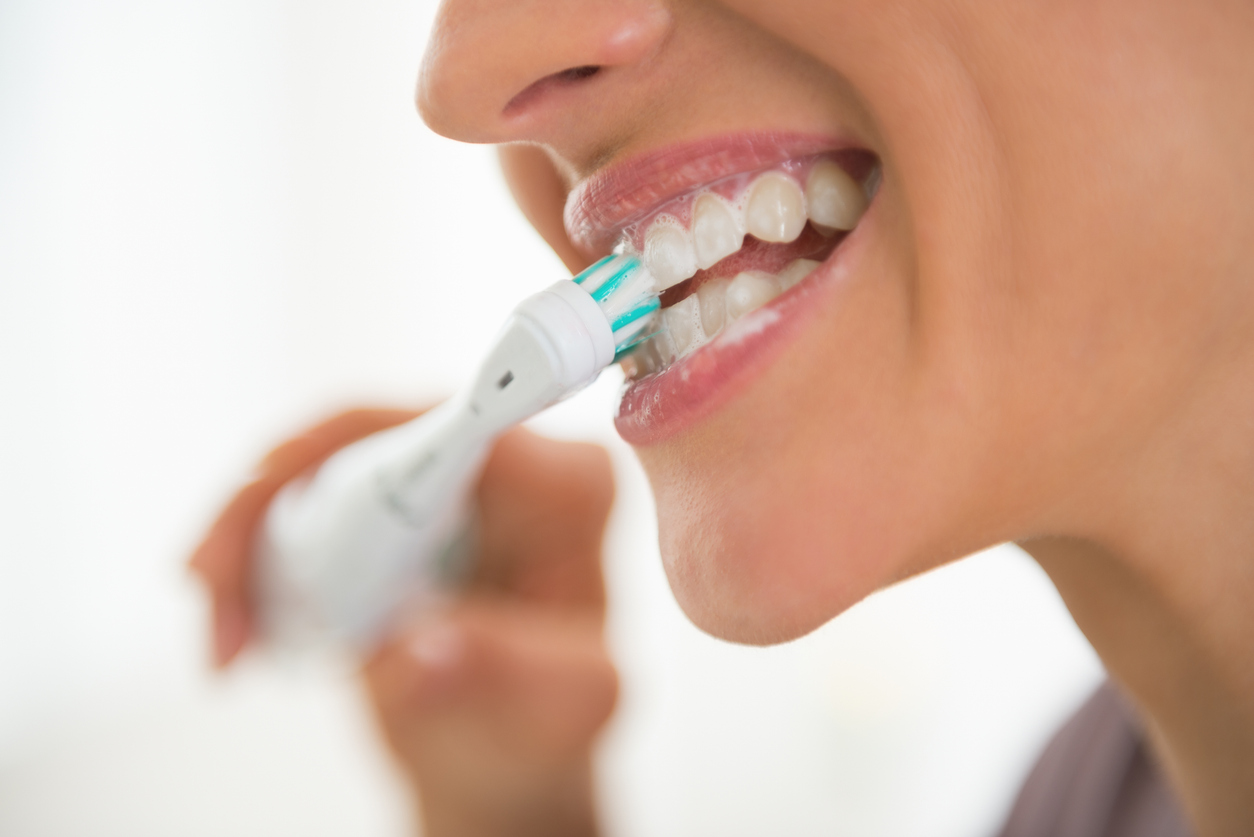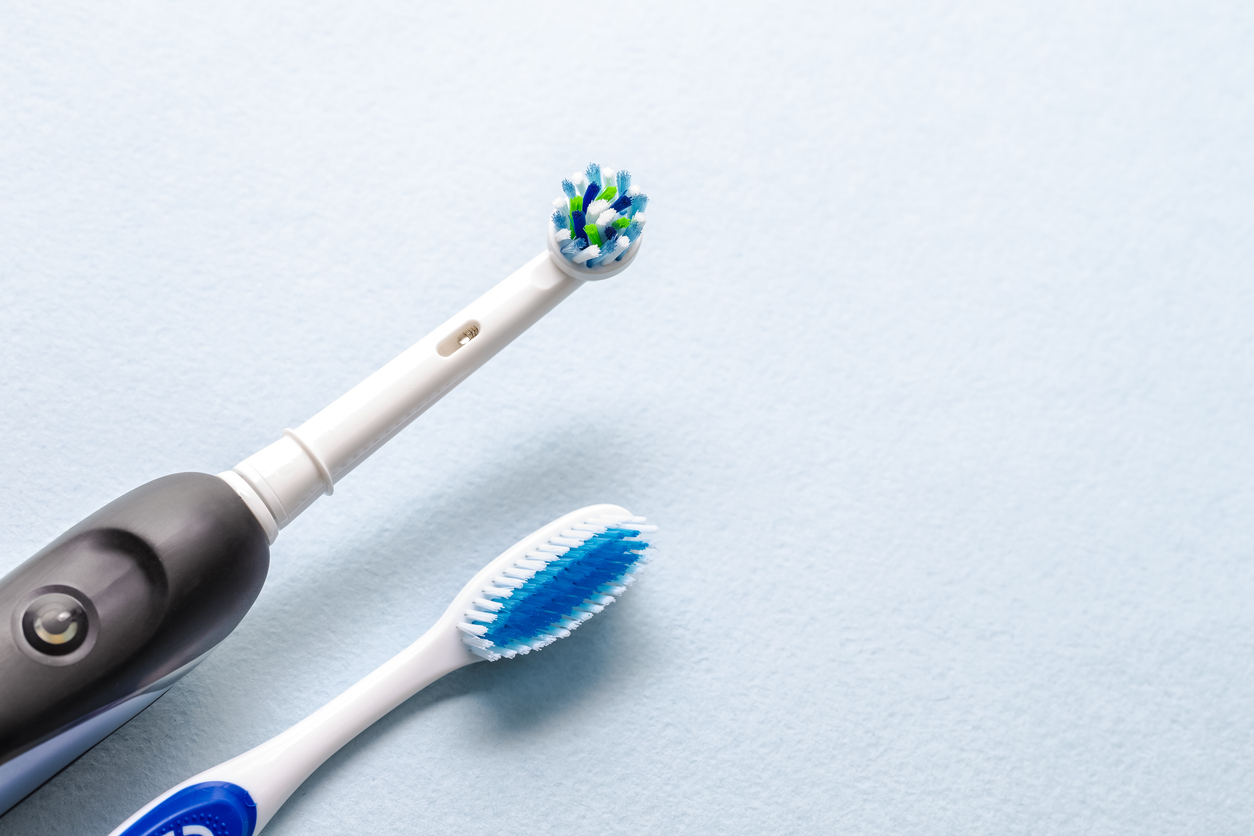October is National Dental Hygiene Month and there’s no better time to celebrate the essentials of good oral health — first and foremost of which is brushing your teeth twice a day.
While brushing your teeth may be a basic habit, there are so many options available in toothbrushes that it can be overwhelming.
At SMILE! Advanced Dental Center in Summerville, SC, we get a lot of questions about the best kind of toothbrush to use — and whether a manual or a powered (electric) model is better. We like to tell our patients that it’s more about consistency and technique than type of toothbrush. Indeed, the American Dental Association (ADA) reports that both electric and manual toothbrushes are effective at removing oral plaque that causes decay and disease.
But, if you’re curious about trading up and channeling the extra power of an electric toothbrush, let’s more closely examine some of the advantages — and potential drawbacks.

Benefits of Electric Toothbrushes
In general, electric toothbrushes are an effective way to help improve your oral health, and we often see patients experiencing some additional perks when switching from manual to powered models.
Pro: More Effective, Reliable Results
Research has shown that an electric toothbrush may just have an edge, compared to a manual toothbrush, when it comes to reliably reducing plaque every day. And that really comes as no surprise, as these powered toothbrushes produce so many more brushstrokes per minute than is possible manually.
In one study, there was an 11% reduction in plaque at one to three months of electric toothbrush usage, and a 21% reduction in plaque after three months of use. For gingivitis, there was a 6% reduction at one to three months of use and an 11% reduction after three months of use.
Pro: Special Features That Boost Effective Brushing
The technology behind electric toothbrushes only is getting better and better, with many models offering a range of special features like built-in, two-minute timers and pressure sensors to help you brush as safely and effectively as possible. You can even find multiple brush modes on some models, which is a great option for those with more sensitive gums or teeth.
Pro: Easy To Use
Another reason people tend to gravitate to electric toothbrushes is how easy they are to use. They take most of the work out of brushing your teeth and make the process more enjoyable.
Pro: Good for Orthodontics
If you have any type of orthodontic appliances, such as braces, electric toothbrushes can be especially beneficial because of their ability to access hard-to-reach surface areas and remove plaque. A study found that they make brushing so much easier and effective in these cases.
Drawbacks of Electric Toothbrushes
There are some potential disadvantages of electric toothbrushes to take into consideration as you evaluate your oral care routine.
Con: Additional Cost
While electric toothbrushes vary significantly in price — from $10 all the way up to $300 and beyond —there’s no question that they are more expensive than their manual counterparts. They also generally need replacement brush heads every three months or so, which can add to the overall investment.
Con: Electricity (or Battery) Requirement
Because they need electricity to work, electric toothbrushes can sometimes
create an inconvenience if you don’t have the ability to recharge them — or extra batteries laying around. We always suggest having a manual toothbrush as a backup — especially when traveling or during any power outages.
Con: Discomfort During Use
While electric toothbrushes generally make brushing your teeth very easy, some people simply don’t prefer the added sensation of the electric brush moving across their teeth.
Just like there are many kinds of manual toothbrushes, there are a range of options for electric toothbrushes, too. For example, you can choose from rotating, oscillating, or sonic technologies (which creates high-frequency waves that help loosen plaque); rechargeable and battery-operated models; Bluetooth connectivity, and more.
—
At SMILE! Advanced Dental Care, we recommend the Sonicare line of electric toothbrushes. They have bristles that oscillate at 62,000 times a minute and will remove 20% more plaque on the tooth surface than a manual brush.
If you feel so inclined, treat your teeth to an electric toothbrush in honor of National Dental Hygiene Month — and make sure you have your bi-annual teeth cleaning and exam on the books. Contact us today to schedule your next appointment.


0 Comments